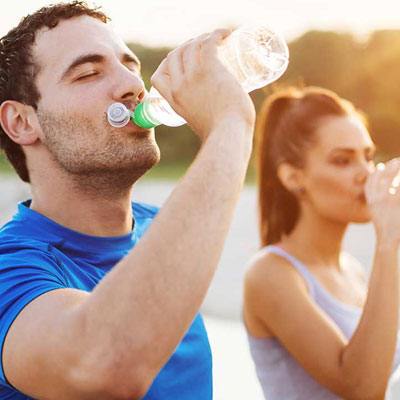Hydration Hints for the Heat of Summer

Water makes up more than 60% of the average adult’s body weight. Most of this is in the cells, blood and around organs. Staying hydrated means keeping the right amount of water in your body so it functions properly.
In warmer weather you sweat more, and you can lose 1-2% of your total water content by the time you feel thirsty. Signs and symptoms of dehydration include dry mouth and eyes, fatigue, muscle cramping, dizziness, and headaches, to name a few.
Tips for Staying Hydrated:
Drink water before you feel thirsty.
Make it easy on yourself, and keep a water container handy. That way you are more likely to take regular sips throughout the day.
Rule of thumb for replacement is still about 2-3 liters of water per adult every day. Divided through the day, it is about eight 8-oz servings.
Lifestyle factors.
Be aware of conditions that contribute to dehydration.
Dehydration happens faster if you: exercise often or heavily, live in a hot climate, are pregnant or breastfeeding, are a child or elderly, or work outside in summer.
In these cases, make sure to drink more than the replacement amount of water as needed.
Eat more fruits and veggies.
Many of these foods have a high water content, contain other nutrients, and are a tasty way to get that extra water.
For example, watermelon is about 90% water content.
Drink a glass of water before each meal and after every time you urinate.
By creating this habit, you will easily drink at least 5 or 6 servings every day.
Add flavor to water if you don’t like it plain.
Try some fruit slices, mint sprigs, cucumbers, or any other extra flavor that makes it more appealing to you.
Avoid too much caffeine and sugar in your drinks.
Caffeine causes increased urination, meaning more water loss. Sugar just adds calories which turns into weight gain.
Hydration Health Benefits:
Brain health. Maintain mental energy and avoid headaches and fatigue.
Skin vitality. Keep your skin from becoming dry, wrinkled, and ‘crepey’.
Weight loss. Water is key in flushing by-products of fat breakdown from your body. Drinking water before meals can also decrease your calorie intake by making you feel fuller.
Physical energy. Helps keep your organs and systems healthier by flushing toxins that may cause fatigue.
Prevent illness. Reduce the risk of catching cold and flu viruses, digestive problems, and others. The flushing function of urination eliminates many toxins which may otherwise lead to disease.


